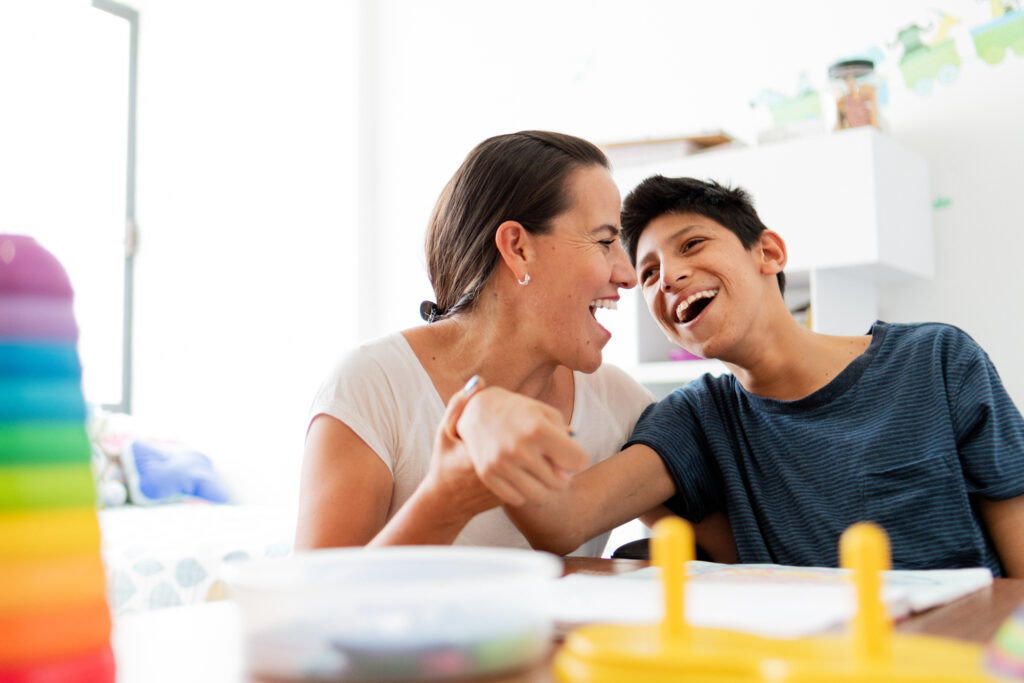Comprehensive Rehabilitation for Brain Injuries

March marks Brain Injury Awareness Month, a time to raise awareness, break down the stigma, and empower those who have survived traumatic brain injuries. About every 9 seconds someone in the U.S. suffers a brain injury caused by anything from sports and recreation to slips and falls to explosives and car accidents. Although brain injuries can happen at any age, older adults and military service members are at particular risk. Often, brain injuries can occur suddenly, leaving individuals and their loved ones grappling with the physical, cognitive, and emotional challenges that follow.
Understanding Brain Injuries
Each brain injury is as unique as the person who suffers from it. There are three types of brain injury:
- A traumatic brain injury (TBI) affects how the brain works and is usually caused by an external force, like a blow to the head or a gunshot.
- A concussion, or mild traumatic brain injury (mTBI), happens when the brain bounces around in the skull; although it is called mTBI, it is not necessarily a mild injury.
- A non-traumatic brain injury, often called an acquired brain injury, is due to an internal factor, like a tumor or lack of oxygen; these injuries cause brain damage.
The Rehabilitation Journey
Rehabilitation following a brain injury is often challenging. As a UCHealth article recently pointed out, “The brain is your body’s control room, so when it gets hurt, the consequences can be extensive, and with each injury comes a different experience.” Physical recovery is most important, but so too is relearning cognitive skills, restoring motor function, and improving communication abilities. Emotional support and counseling are also vital in helping individuals and their families cope with any changes.
Rehabilitation involves different healthcare providers and may occur at different locations (like a hospital or home setting). Adjustments to the plan will happen based on the patient’s evolving needs and abilities. Physical, occupational, and/or speech therapists often collaborate on custom rehabilitation plans for individuals with brain injuries.
Physical therapy following a brain injury focuses on improving mobility, strength, balance, and coordination . For example, a physical therapist may work with the individual to improve their ability to walk safely and efficiently. Through gait training exercises, the person can regain proper walking patterns, balance, and coordination. A brain injury may cause muscle weakness and limited range of motion in various parts of the body . A physical therapist can design exercises to strengthen muscles, improve joint flexibility, and prevent muscle contractures.
Occupational therapy facilitates skill development for independent living and productive participation in work, school, and social activities. An occupational therapist can help someone relearn essential activities of daily living (ADL) such as dressing, grooming, bathing, and eating. They may teach new techniques, add adaptive equipment, or encourage the patient to modify their home or work environment so they can perform the ADLs independently and safely. For cognitive functions like memory, attention, problem-solving, and executive functioning, an occupational therapist may help the client with memory exercises, attention training tasks, and organizational strategies.
Speech therapy addresses difficulties in speech, language, swallowing, and cognitive-communication skills. Speech therapists can assess any speech and language abilities that were caused by the brain injury and develop activities to help the patient improve. Dysphagia, or difficulty swallowing, is a common complication of brain injuries which can lead to choking, aspiration, malnutrition, and dehydration. Speech therapists can instruct individuals with swallowing exercises, diet modifications, and positioning techniques for safety and efficiency.
Brain Injury Awareness Month reminds us of the importance of support and comprehensive rehabilitation for individuals recovering from brain injuries. By recognizing the unique needs of each individual and implementing tailored rehabilitation programs, physical, occupational, and speech therapists can help them regain function, independence, and hope in their lives.
To learn more about CPT’s rehabilitation services for brain or other injuries, connect with us here.
![CPT Rehab [logo]](https://www.cptrehab.com/wp-content/themes/cpt-rehab/images/logo.png)